 i've read a lot of offhand dismissals of Ocean's Twelve in the press surrounding its followup, which surprises me. it was convoluted, sure, but it also branched out stylistically with balls and bravado while holding onto the first film's simple pleasures, and in that sense Thirteen does it one better, grainily gliding on air for two hours, threatening to float away at any moment. unfettered by love interests, danger and/or intrigue, the story itself is a minimalist, good-natured revenge flick populated solely by charisma and clever mischief, but that's no strike against it given its swaggering escapist gait. there's really a lot to be said for charming, star-studded vanity pictures when they're made with sufficient spirit.
i've read a lot of offhand dismissals of Ocean's Twelve in the press surrounding its followup, which surprises me. it was convoluted, sure, but it also branched out stylistically with balls and bravado while holding onto the first film's simple pleasures, and in that sense Thirteen does it one better, grainily gliding on air for two hours, threatening to float away at any moment. unfettered by love interests, danger and/or intrigue, the story itself is a minimalist, good-natured revenge flick populated solely by charisma and clever mischief, but that's no strike against it given its swaggering escapist gait. there's really a lot to be said for charming, star-studded vanity pictures when they're made with sufficient spirit.
Wednesday, June 27, 2007
steven soderbergh's OCEAN'S THIRTEEN (2007)
 i've read a lot of offhand dismissals of Ocean's Twelve in the press surrounding its followup, which surprises me. it was convoluted, sure, but it also branched out stylistically with balls and bravado while holding onto the first film's simple pleasures, and in that sense Thirteen does it one better, grainily gliding on air for two hours, threatening to float away at any moment. unfettered by love interests, danger and/or intrigue, the story itself is a minimalist, good-natured revenge flick populated solely by charisma and clever mischief, but that's no strike against it given its swaggering escapist gait. there's really a lot to be said for charming, star-studded vanity pictures when they're made with sufficient spirit.
i've read a lot of offhand dismissals of Ocean's Twelve in the press surrounding its followup, which surprises me. it was convoluted, sure, but it also branched out stylistically with balls and bravado while holding onto the first film's simple pleasures, and in that sense Thirteen does it one better, grainily gliding on air for two hours, threatening to float away at any moment. unfettered by love interests, danger and/or intrigue, the story itself is a minimalist, good-natured revenge flick populated solely by charisma and clever mischief, but that's no strike against it given its swaggering escapist gait. there's really a lot to be said for charming, star-studded vanity pictures when they're made with sufficient spirit.
Tuesday, June 26, 2007
alfonso cuaron's PRISONER OF AZKABAN (2004) & mike newell's GOBLET OF FIRE (2005)
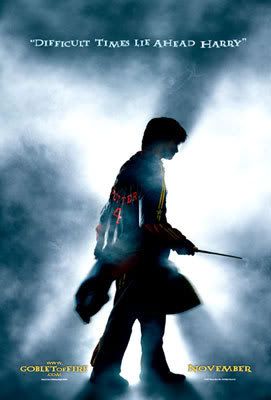 watching it again, it's easy to identify Prisoner Of Azkaban as the best of Harry Potter's screen outings, and it's as much to Cuaron's credit as anyone else's. his Hogwarts (as opposed to Chris Columbus' kiddified tone-down) is better suited to the mysteries and dark times that befall it, and that's symptomatic of the rest of the movie's strengths over the two that came before; Cuaron's realist flourishes give the story a grim grounding it will need as the films progress, and Steve Kloves' smart, subtle changes (vs simple excision) liberate the story from its source material where his other scripts couldn't. once again, the supporting cast is terrific, from Gary Oldman to pinch-hitting Dumbledore Michael Gambon, who brings the character a wry vitality. pity, of course, that pacing problems are built into the time-bending final act, but the film has nothing if not grace to spare.
watching it again, it's easy to identify Prisoner Of Azkaban as the best of Harry Potter's screen outings, and it's as much to Cuaron's credit as anyone else's. his Hogwarts (as opposed to Chris Columbus' kiddified tone-down) is better suited to the mysteries and dark times that befall it, and that's symptomatic of the rest of the movie's strengths over the two that came before; Cuaron's realist flourishes give the story a grim grounding it will need as the films progress, and Steve Kloves' smart, subtle changes (vs simple excision) liberate the story from its source material where his other scripts couldn't. once again, the supporting cast is terrific, from Gary Oldman to pinch-hitting Dumbledore Michael Gambon, who brings the character a wry vitality. pity, of course, that pacing problems are built into the time-bending final act, but the film has nothing if not grace to spare.Newell's Goblet Of Fire, on the other hand, is cursed with Kloves' most leaden adaption - understandable considering the book's length and narrative breadth, but regrettable nonetheless. Goblet hits the notes it needs to for the most part, and the dragon chase is as brilliant as any sequence in the series, but it also makes a few poor decisions where the mystery is concerned, and cuts corners in the larger narrative with surprising recklessness. hopefully Order Of The Phoenix will fare better, and plug some of Goblet's leaks.
Saturday, June 23, 2007
antonia bird's RAVENOUS (1999)
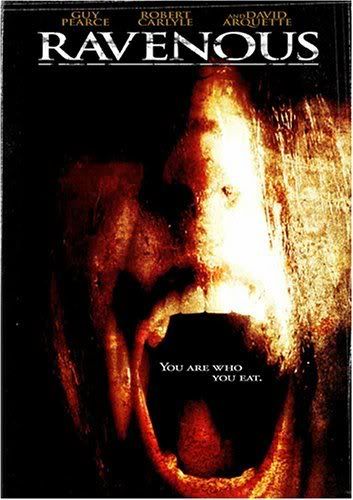 1999 saw the release of a nearly unprecedented batch of offbeat film classics, and among them Ravenous is surely the most underrated, and the only one i return to with any regularity. the cast, scenario, script, tone, look, and score (oh god, the score) are all pitch-perfect and utterly unique. a fun, flawless film that gets better every time i see it.
1999 saw the release of a nearly unprecedented batch of offbeat film classics, and among them Ravenous is surely the most underrated, and the only one i return to with any regularity. the cast, scenario, script, tone, look, and score (oh god, the score) are all pitch-perfect and utterly unique. a fun, flawless film that gets better every time i see it.
michael moore's SICKO (2007)
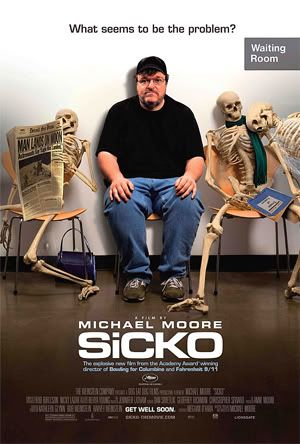 we'll start this where we need to: you already know what you think about Michael Moore. as Fahrenheit 9/11 and its accompanying controversy threatened to wholly commandeer the summer of 2004, it was hard not to take a stance on the portly provocateur, and thanks to his role as F9/11's cheeky protagonist/narrator, even discussion of the film itself eventually veered away from the culture of fear to a cult of personality figureheaded by a smiling, angsty film essayist in a dirty baseball cap. as with most consuming zeitgeists, retrospect reveals a truth somewhere in between the cries of "liar" and "saint"; the film was surely galvanizing and well-meant, but Moore's stagnant ironies and aw-shucks intellectual dishonesty make it hard to return to, as do painful memories of John Kerry's careful squandering of the resulting righteous indignance.
we'll start this where we need to: you already know what you think about Michael Moore. as Fahrenheit 9/11 and its accompanying controversy threatened to wholly commandeer the summer of 2004, it was hard not to take a stance on the portly provocateur, and thanks to his role as F9/11's cheeky protagonist/narrator, even discussion of the film itself eventually veered away from the culture of fear to a cult of personality figureheaded by a smiling, angsty film essayist in a dirty baseball cap. as with most consuming zeitgeists, retrospect reveals a truth somewhere in between the cries of "liar" and "saint"; the film was surely galvanizing and well-meant, but Moore's stagnant ironies and aw-shucks intellectual dishonesty make it hard to return to, as do painful memories of John Kerry's careful squandering of the resulting righteous indignance.forget all that, though. with Sicko, his fifth nonfiction feature, Michael Moore has found a subject in full harmony with his self-image as a shit-stirring über-populist, approaching our desperately misshapen, ethically bankrupt health care system from an angle that eschews Right or Left, addressing us simply and directly as humans, and, what's more, Americans. where much of his recent work has favored a tone of glib anger, he here tempers his comedy with a quiet, moral sadness, and the result is by no small measure his most restrained, focused and affecting work to date, utterly engaging and enraging from its first frames.
the film opens (after a gem of a Dubya soundbyte) with a short collection of horror stories of the uninsured, including a man who was forced to choose which of two severed fingertips to reattach following an accident. (he opted for the cheaper of the two, paying $12,000 for a restored ring finger.) but this, as Moore soon informs us, is not a film about the uninsured – it's a film about the hundreds of millions of Americans who do have health insurance…and the surprising thinness of the line between the two.
indeed, the first act of Sicko dedicates itself to a devastating exposé of the insurance industry's cackling disdain for its preyed-upon policyholders, and Moore wisely focuses on the individual, from the "insured" (farce has rarely been so ruthlessly poignant as when Moore unshakily announces one woman's fate) to those who operate within the system, including a claims executive doing right by her conscience in front of a Congressional panel. naturally, though, the pols are in on the fix, as illustrated in a sequence detailing the bedroom antics of the medical industry and our legislative branch. (Moore, by the way, should go ahead and consider himself stricken from Hillary's Christmas card list.) this extended lament culminates in a succinct, razor-sharp montage deconstructing the insidious medical-industrial complex and its seemingly irrevocable role in American society, a sequence among Moore's very best work.
but what hope, then, do we have? most of the remainder of Sicko's running time finds Moore and his crew looking to our Western peers for answers. or, rather, one answer: forays to Canada, Britain, and France reveal socialized infrastructures in which all citizens are provided free medical care as a matter of course. such ideas are, of course, subject to scorn and ridicule in the United States, but as Moore affably badgers his way through emergency rooms and chemist's shoppes with wide-eyed incredulity, every bemused foreign smile suggests our own system as a sad, sick joke. no matter your familiarity with socialized medicine abroad, these trips hold some funny and thought-provoking moments, but the thrust of the sequence is consistent, and adamant: even our most staunchly capitalistic brothers and sisters around the world see universal healthcare as a clear moral and ethical imperative. even Moore's journey to Cuba with medically disenfranchised 9/11 workers depicts an obviously healthy government-run healthcare system, including a pharmacy where a cancer survivor is able to purchase her medicine for literally 1/2400th the price she pays in the United States.
this is strong stuff, but in the wrong hands (say, Moore's circa 2003) it might be just another entry in the string of activist nonfiction films for which Bowling For Columbine opened the floodgates – either narratively inert, fatally smug, or both. luckily, the determined humanism of this labor of love seems to have softened the Michael Moore we know and love to hate, or vice versa. Sicko does occasionally find him up to his old tricks, dabbling in ironic stock footage, clumsy pop music, and rhetorical silliness, but it's far less distracting here than in his previous work, thanks largely to a more careful attention to the ideas in play, and the proper way to string them together. he resists unnecessary rants and tangents, and downplays his own role in the proceedings; where Moore took center stage in Fahrenheit 9/11's struggle for truth and propriety, Sicko gracefully cedes the struggle to us, our families, and our friends, in a spirit of heartsick populism.
the film isn’t flawless – there’s a sour note toward the end regarding an act of charity, and the relatively unscathed pharmaceutical industry merited some of the running time reserved for his European jaunt – but it hits hard, and through its pessimism it is fundamentally right-minded. Sicko has, and fully earns, the power to put health care back at the forefront of our national dialogue, and wraps it in a devastating piece of entertainment. Michael Moore, you old buffoon, you done good.
(from the KNOXVILLE VOICE)
Sunday, June 10, 2007
orson welles' F FOR FAKE (1974)
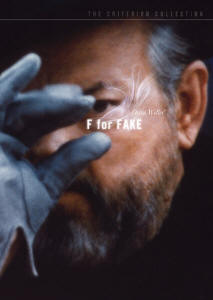 what a strange cat Orson Welles was. F For Fake isn't so much a documentary or even an essay as a hyperactive meditation on trickery and fakedom; Welles imposes an assaulting, visually and narratively convoluted approach on what begins a portrait of two master tricksters and eventually devolves into hammy expressionism. but aside from the obvious inflation of the film's running time (there's little more than an hour's worth of good material), the pretentious self-indulgence of it all does nothing to allay his brilliance...or vice versa. IMDb indicates this was his last proper directorial effort, but the bravado that was there from the start still bleeds from every frame decades later.
what a strange cat Orson Welles was. F For Fake isn't so much a documentary or even an essay as a hyperactive meditation on trickery and fakedom; Welles imposes an assaulting, visually and narratively convoluted approach on what begins a portrait of two master tricksters and eventually devolves into hammy expressionism. but aside from the obvious inflation of the film's running time (there's little more than an hour's worth of good material), the pretentious self-indulgence of it all does nothing to allay his brilliance...or vice versa. IMDb indicates this was his last proper directorial effort, but the bravado that was there from the start still bleeds from every frame decades later.
eli roth's HOSTEL PART II (2007)
 it's hard for me to decide just how i feel about Eli Roth, but one thought struck me while watching Hostel II: he's smarter than i am. smarter than me, smarter than his audience, smarter, certainly, than most of his peers in the world of cinematic horror. that's not to say that Hostel's sequel has quite as much going on upstairs as its predecessor's wry politics of exploitation; no, this time around we know the name of the game, if not all the rules, so Roth whittles his goals down to wit instead. it's been clear since Cabin Fever that much of Roth's dangerousness lays in a command of tone that doesn't find terror and laughter at odds with each other - it may be comic, but it's not relief. (i think an understandable misperception of "flippancy" is what sends so many film critics, who should at least acknowledge the man's craft, into indignant Culture Critic mode. c'est la vie.) here, of course, there isn't much room for overt textual humor, but Roth's ruthless talents still bring a giddiness to the proceedings, from his carefully ironic sense of montage to a narrative that consistently delights in subverting our lazy Horror Flick expectations on several levels, often at once.
it's hard for me to decide just how i feel about Eli Roth, but one thought struck me while watching Hostel II: he's smarter than i am. smarter than me, smarter than his audience, smarter, certainly, than most of his peers in the world of cinematic horror. that's not to say that Hostel's sequel has quite as much going on upstairs as its predecessor's wry politics of exploitation; no, this time around we know the name of the game, if not all the rules, so Roth whittles his goals down to wit instead. it's been clear since Cabin Fever that much of Roth's dangerousness lays in a command of tone that doesn't find terror and laughter at odds with each other - it may be comic, but it's not relief. (i think an understandable misperception of "flippancy" is what sends so many film critics, who should at least acknowledge the man's craft, into indignant Culture Critic mode. c'est la vie.) here, of course, there isn't much room for overt textual humor, but Roth's ruthless talents still bring a giddiness to the proceedings, from his carefully ironic sense of montage to a narrative that consistently delights in subverting our lazy Horror Flick expectations on several levels, often at once. oddly enough, it's these stymied conventions (in collaboration with Roth's stomach-turning fearlessness) that give Hostel II such an atmosphere of doom. our protagonists' fates aren't going to hinge on the stupid decisions that drive so many slasher films, nor will they escape by pure luck or panicked cunning; their doom is signed, sealed, and delivered the moment their passports cross the hostel's front desk. but within these confines, the audience, too, is cornered, subject to the film's cruel, largely unpredictable whims, from the harrowing, nauseating Bathory centerpiece (followed, true to form, by a sharp Eisensteinian gag) to the mercilessly nutty ending. Hostel II is in no uncertain terms unfit for general consumption, but it also reaffirms Eli Roth as horror's reigning enfant terrible, revitalizing the stagnant gere while beating its hacks at their own game.
Friday, June 08, 2007
toshia fujita's LADY SNOWBLOOD (1973)
 as easy as it is to see the Lady Snowblood influence in Kill Bill, it's even easier to see why. on one level, it's a typical revenge story, as a young woman born to reap revenge stalks the aging bandits responsible for the fate of her mother and would-be father, and gallons of spewing, strawberry-hued blood are presumed to fill the void carved out by shallow characters and unimaginative scenario. but there are isolated moments of wit, creativity, and distinct visual panache (Fujita's composition and control of color can be inspired, though my favorite single image is young Snowblood's ponytail whipping around as she rolls down the hill in a barrel) and the explicit four-act structure is only slighty offputting narratively. it's not a great film, but there's a lot of ideas, and a fair bit of revenge-fueled fun.
as easy as it is to see the Lady Snowblood influence in Kill Bill, it's even easier to see why. on one level, it's a typical revenge story, as a young woman born to reap revenge stalks the aging bandits responsible for the fate of her mother and would-be father, and gallons of spewing, strawberry-hued blood are presumed to fill the void carved out by shallow characters and unimaginative scenario. but there are isolated moments of wit, creativity, and distinct visual panache (Fujita's composition and control of color can be inspired, though my favorite single image is young Snowblood's ponytail whipping around as she rolls down the hill in a barrel) and the explicit four-act structure is only slighty offputting narratively. it's not a great film, but there's a lot of ideas, and a fair bit of revenge-fueled fun.
Tuesday, June 05, 2007
judd apatow's KNOCKED UP (2007)
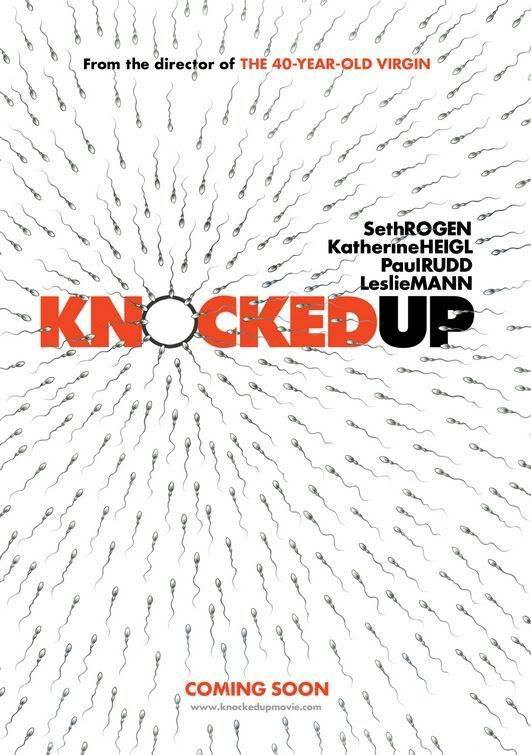 after Rock Hunter so impressed me, it's nice to see a contemporary comedy with a little respect for its audience, and for the medium. Knocked Up is heavier and looser than Apatow's The 40-Year Old Virgin, but the somewhat lower concept serves his honest, character-driven humor fabulously; it's exhilirating to see a film unleash such relentless howlers without stooping to the contrivance (and mean-spiritedness) that taints so much mainstream comedy. (there's some pop culture humor that may or may not date well, but it stems from the characters, and where their conversations and in-jokes might believably stray, as opposed the reference-fest dreck of "Family Guy" or, say, the Shrek movies.) but Knocked Up is in essence as much a relationship drama as a bawdy romantic comedy, and Apatow's keen verisimilitude proves just as strong an asset on the serious side of things - undoubtedly the key to his strengths as a humorist. the two couples at the center of the film are painfully sharp sketches of both the politics of modern romance and the precipitous psychological divide between men and women, and each character is written with a careful emotional intelligence. a lot of recent screen humor has trended toward the exaggeratedly uncomfortable comedy of errors, but with Knocked Up Judd Apatow outdoes the best of them not only in sheer laughs, but also, and more profoundly, in a spirit of fearless insight.
after Rock Hunter so impressed me, it's nice to see a contemporary comedy with a little respect for its audience, and for the medium. Knocked Up is heavier and looser than Apatow's The 40-Year Old Virgin, but the somewhat lower concept serves his honest, character-driven humor fabulously; it's exhilirating to see a film unleash such relentless howlers without stooping to the contrivance (and mean-spiritedness) that taints so much mainstream comedy. (there's some pop culture humor that may or may not date well, but it stems from the characters, and where their conversations and in-jokes might believably stray, as opposed the reference-fest dreck of "Family Guy" or, say, the Shrek movies.) but Knocked Up is in essence as much a relationship drama as a bawdy romantic comedy, and Apatow's keen verisimilitude proves just as strong an asset on the serious side of things - undoubtedly the key to his strengths as a humorist. the two couples at the center of the film are painfully sharp sketches of both the politics of modern romance and the precipitous psychological divide between men and women, and each character is written with a careful emotional intelligence. a lot of recent screen humor has trended toward the exaggeratedly uncomfortable comedy of errors, but with Knocked Up Judd Apatow outdoes the best of them not only in sheer laughs, but also, and more profoundly, in a spirit of fearless insight.
Subscribe to:
Posts (Atom)



